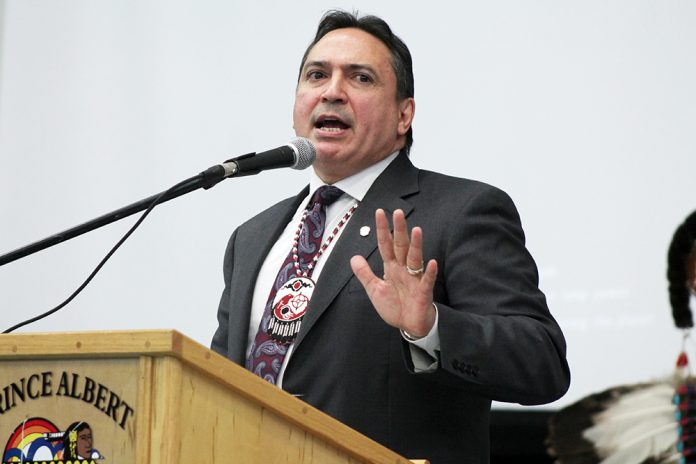
The leader of Canada’s umbrella First Nations group was in Prince Albert Thursday, updating Saskatchewan’s chiefs on the state of Prime Minister Trudeau’s long list of promises.
Perry Bellegarde, National Chief of the Assembly of First Nations, spoke in the Senator Allen Bird Memorial Centre, where delegates to the province’s Federation of Sovereign Indigenous Nations are holding their spring assembly.
“When I look at whats going on across this great country, this great land, things are changing,” he told the chiefs. “But it’s slow.”
He said Trudeau has committed to protect indigenous languages, to reconcile with residential school survivors and to gut outdated laws. The last two federal budgets earmarked billions for First Nations. But policies are slow to change, he said, and much of the money has yet to flow to the reserves.
Bellegarde blamed it on inertia in Canada’s bureaucracy – especially in Indigenous and Northern Affairs.
“The Prime Minister’s and cabinet’s vision is huge,” he said in a media scrum after his speech. “Unfortunately the bureaucrats and departmental officials are very narrow, and they still operate under the old way of doing business.
“We may have all these dollar figures in the federal budget, but we have to find ways and means to get them out to the communities in a more effective way.”
He said the AFN will continue to press the Privy Council Office – the uppermost echelon of Canada’s public service – for policies that respect indigenous rights. First Nations aren’t asking for handouts, he said, but their share of wealth earned off their ancestral territories.
“These rights that we get as treaty people, as indigenous peoples, aren’t supposed to come from the backs of Canadian taxpayers. That’s a misnomer,” he told the assembly. “Everything we get is supposed to come from the sharing of the nation’s resource wealth.
“Our white brothers and sisters call it GDP… There’s so many billions upon billions upon billions that have been taken, so what comes back to our people is a very minor piece.”
He admitted that it might be hard to get Canada’s settler majority on board. But to work together and build a better country, he said, people need to “know the history.” The foundations of Canada, Bellegarde told reporters, are based on an “illegal racist doctrine.”
“How did the Crown get entitled to our lands and territories and resources?” he asked. “Through the doctrine of discovery and implementing the concept of terra nullius – vacant land – but indigenous peoples were here.”
That idea was upheld by Catholic popes of bygone days, he pointed out. Bellegarde wants to secure a meeting with Pope Francis to right past wrongs. And terra nullius is only the first thing he hopes to discuss.
“We’re trying to get him to come to Canada in 2018 for a visit,” he said. “…to formally make an apology to the survivors of the residential schools, because the Catholic Church is the only church that has not formally made an apology.”
In his speech, Bellegarde commended Trudeau for agreeing to implement all 94 recommendations of the Truth and Reconciliation Commission, which investigated the abuses committed in Canada’s residential schools. But he asked the chiefs: “where is the plan?”
He took a similar view on the inquiry into missing and murdered indigenous women and girls. He thanked Trudeau for the gesture, saying “prior to that there was nothing,” but he found some fault in the execution. Families, he said, have said their voices aren’t being heard. And when families have concerns, Bellegarde said, he’s concerned as well.
“There’s some challenges and some issues with the inquiry right now,” he told the delegates. “There are some things that have to be fixed, no question. We support the inquiry going forward, because when you look at the end of it, it’s really about ending violence in our communities.”
Despite federal commitments, he stressed that First Nations communities continue to struggle – and that it will take far more work to close the gaps that hold them back.
“What you see is poverty among our people,” he said. “What you see is overcrowded housing, what you see is black mould, what you see is inadequate schools, what you see is caps on education funding, what you see is high youth suicide rates, what you see is a disproportionate number of our people in jails. That’s what you see, and that’s not acceptable.
“Cabinet says one thing, but the bureaucracy is the other one that has to catch up to speed, and everyone’s got to help push them.”
For more on this story, see the May 19 print or e-edition of the Daily Herald.

